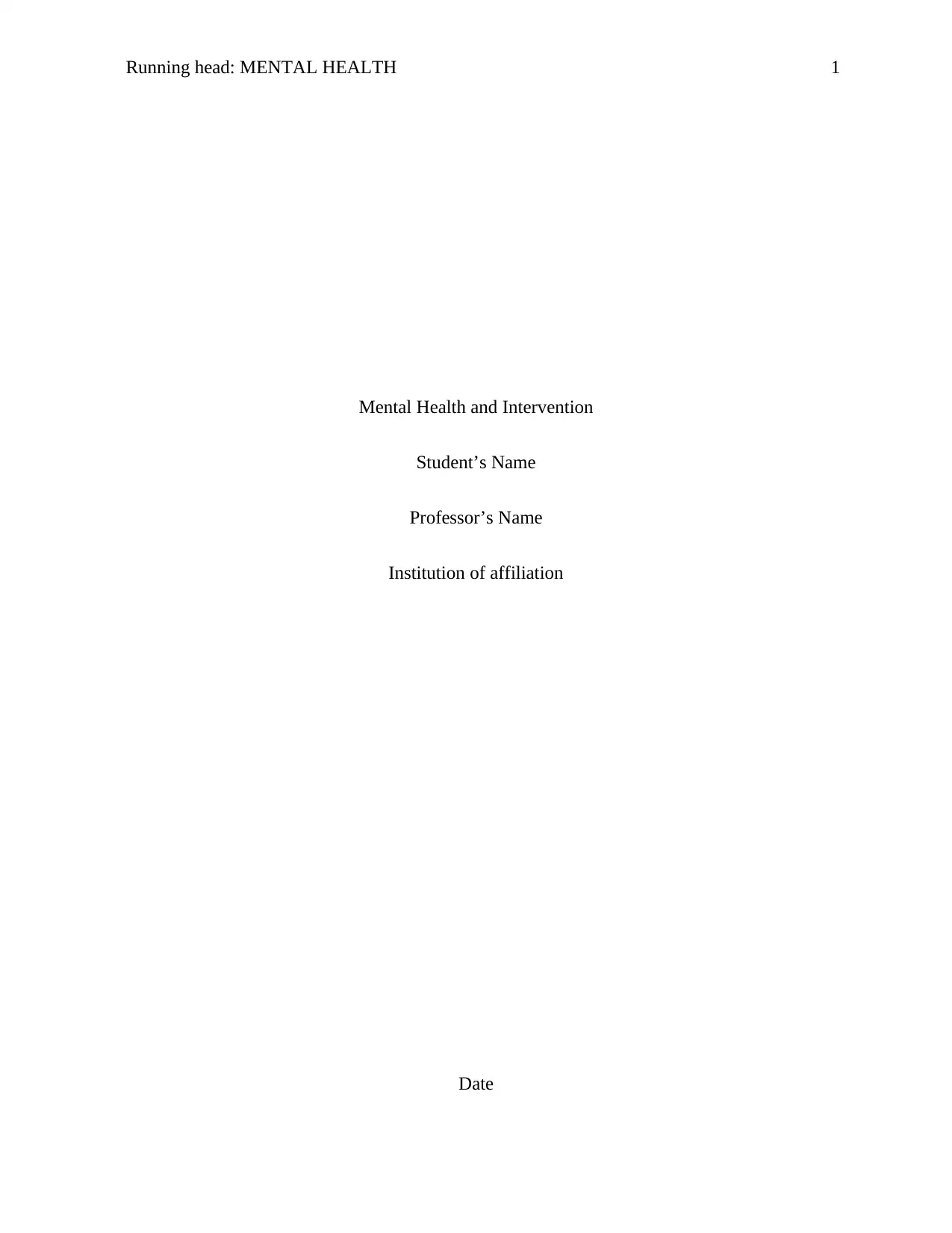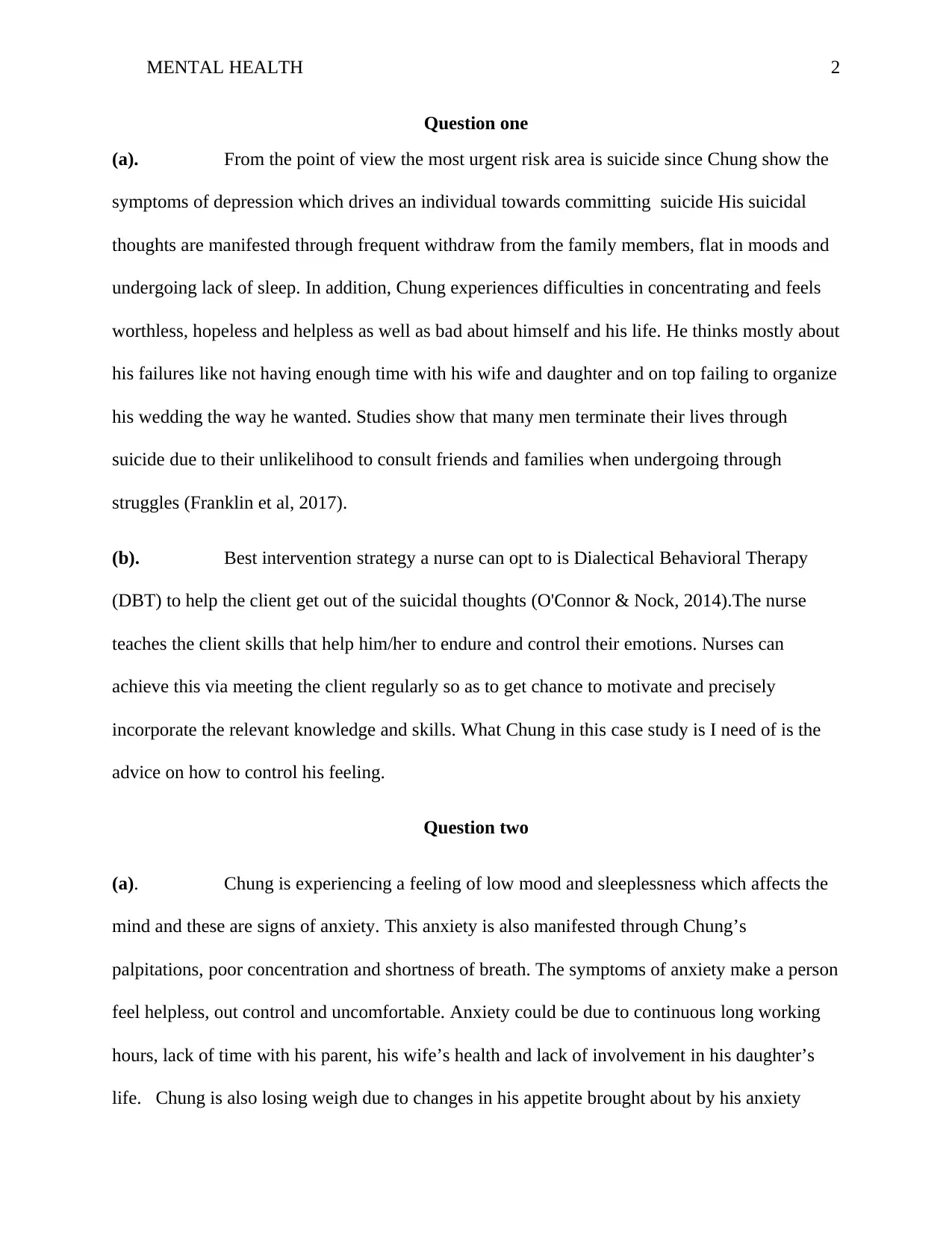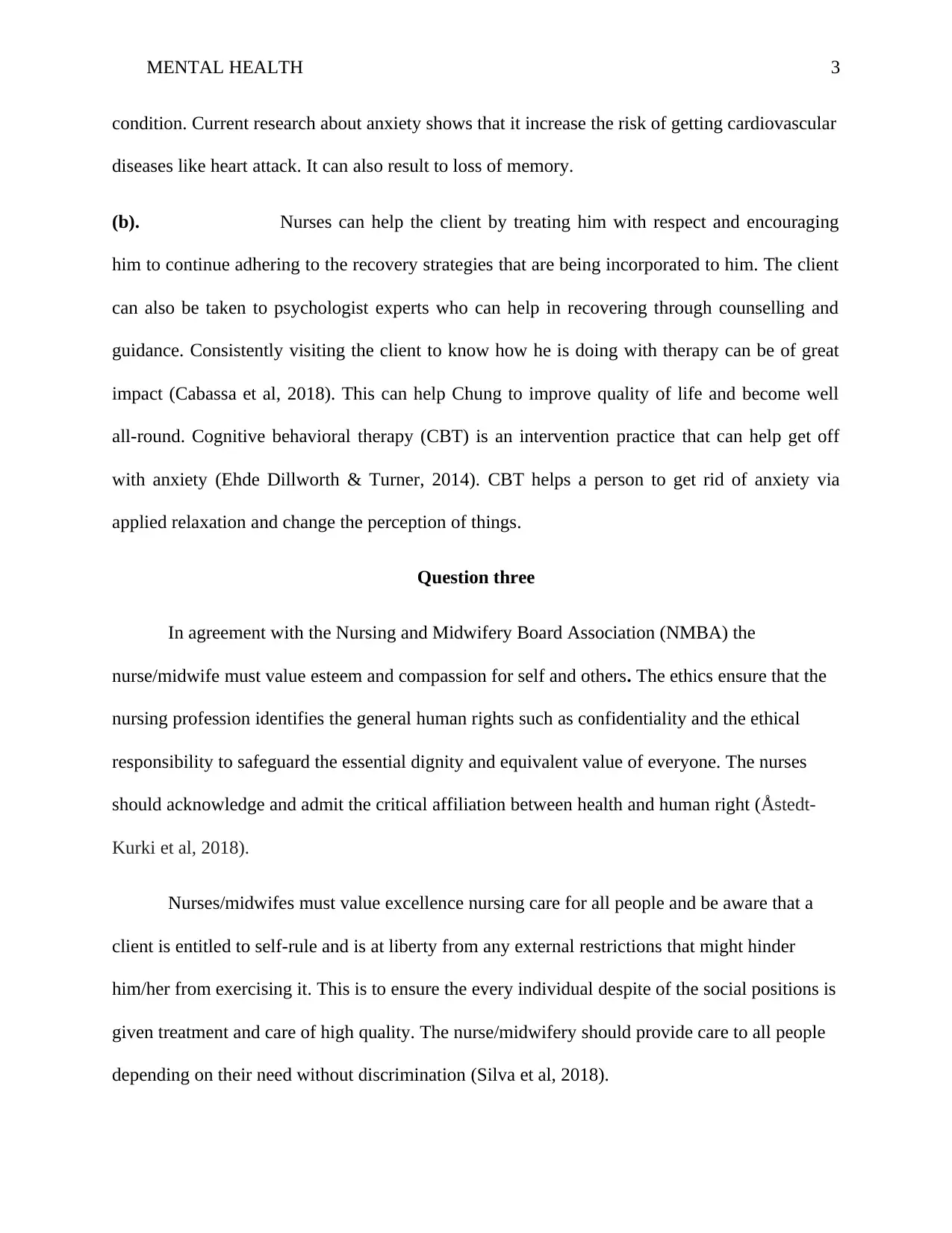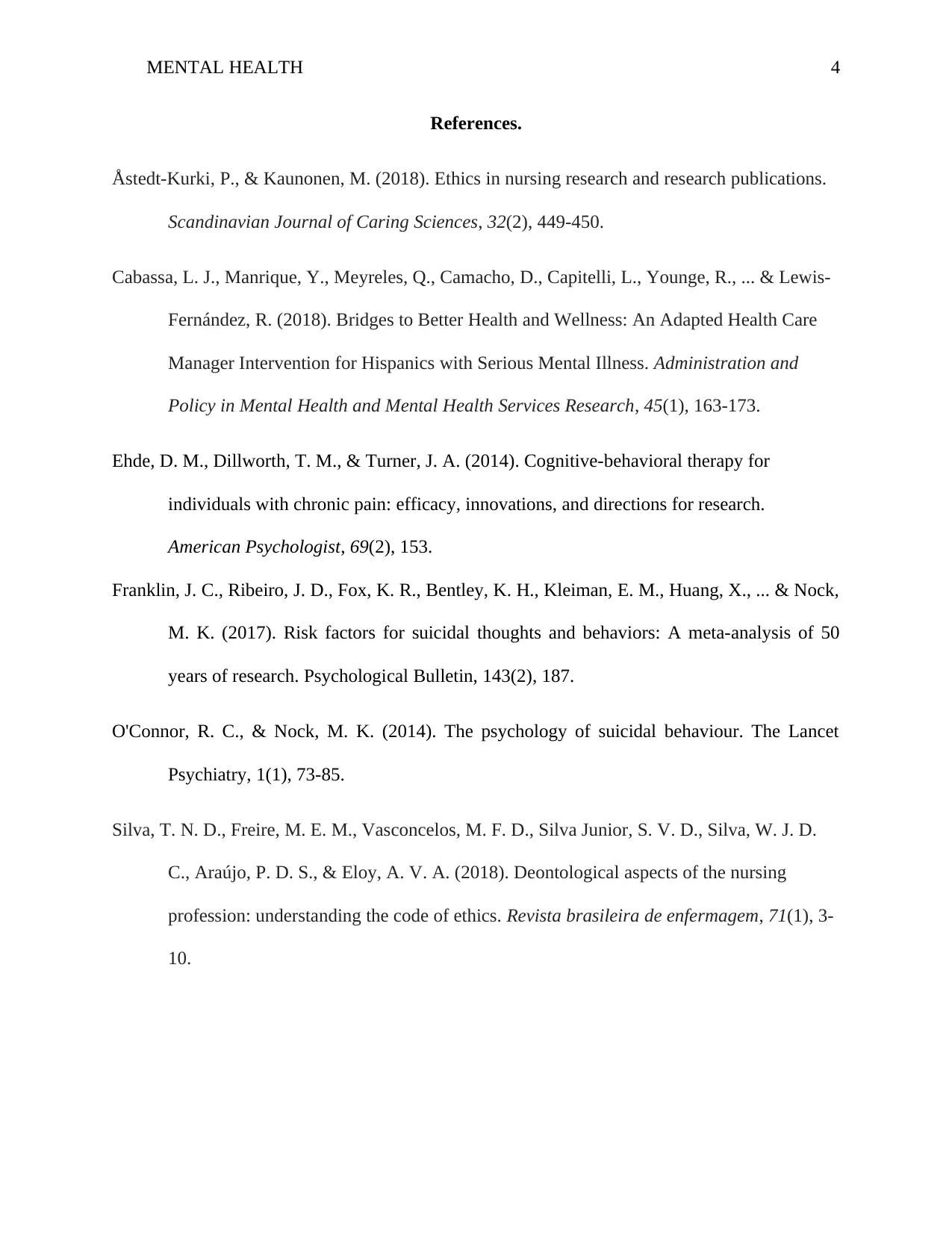401013 - Mental Health Nursing: Case Study Analysis & Intervention
VerifiedAdded on 2023/06/03
|4
|1022
|392
Case Study
AI Summary
This assignment presents a case study of Chung, a 35-year-old doctor experiencing mental health challenges. It identifies suicide risk as the most urgent concern, citing Chung's depressive symptoms, withdrawal, and suicidal thoughts. Dialectical Behavior Therapy (DBT) is recommended as a primary intervention strategy. The assignment also addresses Chung's anxiety, manifested through palpitations, poor concentration, and shortness of breath, suggesting Cognitive Behavioral Therapy (CBT) as a helpful intervention. The importance of ethical nursing practices, including respect, compassion, and non-discrimination, is emphasized. The analysis draws upon current literature to support the chosen interventions and ethical considerations, aligning with the Nursing and Midwifery Board Association (NMBA) guidelines. Desklib offers a range of solved assignments and study tools for students.

Running head: MENTAL HEALTH 1
Mental Health and Intervention
Student’s Name
Professor’s Name
Institution of affiliation
Date
Mental Health and Intervention
Student’s Name
Professor’s Name
Institution of affiliation
Date
Paraphrase This Document
Need a fresh take? Get an instant paraphrase of this document with our AI Paraphraser

MENTAL HEALTH 2
Question one
(a). From the point of view the most urgent risk area is suicide since Chung show the
symptoms of depression which drives an individual towards committing suicide His suicidal
thoughts are manifested through frequent withdraw from the family members, flat in moods and
undergoing lack of sleep. In addition, Chung experiences difficulties in concentrating and feels
worthless, hopeless and helpless as well as bad about himself and his life. He thinks mostly about
his failures like not having enough time with his wife and daughter and on top failing to organize
his wedding the way he wanted. Studies show that many men terminate their lives through
suicide due to their unlikelihood to consult friends and families when undergoing through
struggles (Franklin et al, 2017).
(b). Best intervention strategy a nurse can opt to is Dialectical Behavioral Therapy
(DBT) to help the client get out of the suicidal thoughts (O'Connor & Nock, 2014).The nurse
teaches the client skills that help him/her to endure and control their emotions. Nurses can
achieve this via meeting the client regularly so as to get chance to motivate and precisely
incorporate the relevant knowledge and skills. What Chung in this case study is I need of is the
advice on how to control his feeling.
Question two
(a). Chung is experiencing a feeling of low mood and sleeplessness which affects the
mind and these are signs of anxiety. This anxiety is also manifested through Chung’s
palpitations, poor concentration and shortness of breath. The symptoms of anxiety make a person
feel helpless, out control and uncomfortable. Anxiety could be due to continuous long working
hours, lack of time with his parent, his wife’s health and lack of involvement in his daughter’s
life. Chung is also losing weigh due to changes in his appetite brought about by his anxiety
Question one
(a). From the point of view the most urgent risk area is suicide since Chung show the
symptoms of depression which drives an individual towards committing suicide His suicidal
thoughts are manifested through frequent withdraw from the family members, flat in moods and
undergoing lack of sleep. In addition, Chung experiences difficulties in concentrating and feels
worthless, hopeless and helpless as well as bad about himself and his life. He thinks mostly about
his failures like not having enough time with his wife and daughter and on top failing to organize
his wedding the way he wanted. Studies show that many men terminate their lives through
suicide due to their unlikelihood to consult friends and families when undergoing through
struggles (Franklin et al, 2017).
(b). Best intervention strategy a nurse can opt to is Dialectical Behavioral Therapy
(DBT) to help the client get out of the suicidal thoughts (O'Connor & Nock, 2014).The nurse
teaches the client skills that help him/her to endure and control their emotions. Nurses can
achieve this via meeting the client regularly so as to get chance to motivate and precisely
incorporate the relevant knowledge and skills. What Chung in this case study is I need of is the
advice on how to control his feeling.
Question two
(a). Chung is experiencing a feeling of low mood and sleeplessness which affects the
mind and these are signs of anxiety. This anxiety is also manifested through Chung’s
palpitations, poor concentration and shortness of breath. The symptoms of anxiety make a person
feel helpless, out control and uncomfortable. Anxiety could be due to continuous long working
hours, lack of time with his parent, his wife’s health and lack of involvement in his daughter’s
life. Chung is also losing weigh due to changes in his appetite brought about by his anxiety

MENTAL HEALTH 3
condition. Current research about anxiety shows that it increase the risk of getting cardiovascular
diseases like heart attack. It can also result to loss of memory.
(b). Nurses can help the client by treating him with respect and encouraging
him to continue adhering to the recovery strategies that are being incorporated to him. The client
can also be taken to psychologist experts who can help in recovering through counselling and
guidance. Consistently visiting the client to know how he is doing with therapy can be of great
impact (Cabassa et al, 2018). This can help Chung to improve quality of life and become well
all-round. Cognitive behavioral therapy (CBT) is an intervention practice that can help get off
with anxiety (Ehde Dillworth & Turner, 2014). CBT helps a person to get rid of anxiety via
applied relaxation and change the perception of things.
Question three
In agreement with the Nursing and Midwifery Board Association (NMBA) the
nurse/midwife must value esteem and compassion for self and others. The ethics ensure that the
nursing profession identifies the general human rights such as confidentiality and the ethical
responsibility to safeguard the essential dignity and equivalent value of everyone. The nurses
should acknowledge and admit the critical affiliation between health and human right (Åstedt‐
Kurki et al, 2018).
Nurses/midwifes must value excellence nursing care for all people and be aware that a
client is entitled to self-rule and is at liberty from any external restrictions that might hinder
him/her from exercising it. This is to ensure the every individual despite of the social positions is
given treatment and care of high quality. The nurse/midwifery should provide care to all people
depending on their need without discrimination (Silva et al, 2018).
condition. Current research about anxiety shows that it increase the risk of getting cardiovascular
diseases like heart attack. It can also result to loss of memory.
(b). Nurses can help the client by treating him with respect and encouraging
him to continue adhering to the recovery strategies that are being incorporated to him. The client
can also be taken to psychologist experts who can help in recovering through counselling and
guidance. Consistently visiting the client to know how he is doing with therapy can be of great
impact (Cabassa et al, 2018). This can help Chung to improve quality of life and become well
all-round. Cognitive behavioral therapy (CBT) is an intervention practice that can help get off
with anxiety (Ehde Dillworth & Turner, 2014). CBT helps a person to get rid of anxiety via
applied relaxation and change the perception of things.
Question three
In agreement with the Nursing and Midwifery Board Association (NMBA) the
nurse/midwife must value esteem and compassion for self and others. The ethics ensure that the
nursing profession identifies the general human rights such as confidentiality and the ethical
responsibility to safeguard the essential dignity and equivalent value of everyone. The nurses
should acknowledge and admit the critical affiliation between health and human right (Åstedt‐
Kurki et al, 2018).
Nurses/midwifes must value excellence nursing care for all people and be aware that a
client is entitled to self-rule and is at liberty from any external restrictions that might hinder
him/her from exercising it. This is to ensure the every individual despite of the social positions is
given treatment and care of high quality. The nurse/midwifery should provide care to all people
depending on their need without discrimination (Silva et al, 2018).
⊘ This is a preview!⊘
Do you want full access?
Subscribe today to unlock all pages.

Trusted by 1+ million students worldwide

MENTAL HEALTH 4
References.
Åstedt‐Kurki, P., & Kaunonen, M. (2018). Ethics in nursing research and research publications.
Scandinavian Journal of Caring Sciences, 32(2), 449-450.
Cabassa, L. J., Manrique, Y., Meyreles, Q., Camacho, D., Capitelli, L., Younge, R., ... & Lewis-
Fernández, R. (2018). Bridges to Better Health and Wellness: An Adapted Health Care
Manager Intervention for Hispanics with Serious Mental Illness. Administration and
Policy in Mental Health and Mental Health Services Research, 45(1), 163-173.
Ehde, D. M., Dillworth, T. M., & Turner, J. A. (2014). Cognitive-behavioral therapy for
individuals with chronic pain: efficacy, innovations, and directions for research.
American Psychologist, 69(2), 153.
Franklin, J. C., Ribeiro, J. D., Fox, K. R., Bentley, K. H., Kleiman, E. M., Huang, X., ... & Nock,
M. K. (2017). Risk factors for suicidal thoughts and behaviors: A meta-analysis of 50
years of research. Psychological Bulletin, 143(2), 187.
O'Connor, R. C., & Nock, M. K. (2014). The psychology of suicidal behaviour. The Lancet
Psychiatry, 1(1), 73-85.
Silva, T. N. D., Freire, M. E. M., Vasconcelos, M. F. D., Silva Junior, S. V. D., Silva, W. J. D.
C., Araújo, P. D. S., & Eloy, A. V. A. (2018). Deontological aspects of the nursing
profession: understanding the code of ethics. Revista brasileira de enfermagem, 71(1), 3-
10.
References.
Åstedt‐Kurki, P., & Kaunonen, M. (2018). Ethics in nursing research and research publications.
Scandinavian Journal of Caring Sciences, 32(2), 449-450.
Cabassa, L. J., Manrique, Y., Meyreles, Q., Camacho, D., Capitelli, L., Younge, R., ... & Lewis-
Fernández, R. (2018). Bridges to Better Health and Wellness: An Adapted Health Care
Manager Intervention for Hispanics with Serious Mental Illness. Administration and
Policy in Mental Health and Mental Health Services Research, 45(1), 163-173.
Ehde, D. M., Dillworth, T. M., & Turner, J. A. (2014). Cognitive-behavioral therapy for
individuals with chronic pain: efficacy, innovations, and directions for research.
American Psychologist, 69(2), 153.
Franklin, J. C., Ribeiro, J. D., Fox, K. R., Bentley, K. H., Kleiman, E. M., Huang, X., ... & Nock,
M. K. (2017). Risk factors for suicidal thoughts and behaviors: A meta-analysis of 50
years of research. Psychological Bulletin, 143(2), 187.
O'Connor, R. C., & Nock, M. K. (2014). The psychology of suicidal behaviour. The Lancet
Psychiatry, 1(1), 73-85.
Silva, T. N. D., Freire, M. E. M., Vasconcelos, M. F. D., Silva Junior, S. V. D., Silva, W. J. D.
C., Araújo, P. D. S., & Eloy, A. V. A. (2018). Deontological aspects of the nursing
profession: understanding the code of ethics. Revista brasileira de enfermagem, 71(1), 3-
10.
1 out of 4
Related Documents
Your All-in-One AI-Powered Toolkit for Academic Success.
+13062052269
info@desklib.com
Available 24*7 on WhatsApp / Email
![[object Object]](/_next/static/media/star-bottom.7253800d.svg)
Unlock your academic potential
Copyright © 2020–2026 A2Z Services. All Rights Reserved. Developed and managed by ZUCOL.


